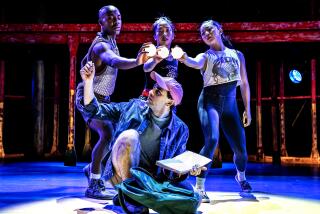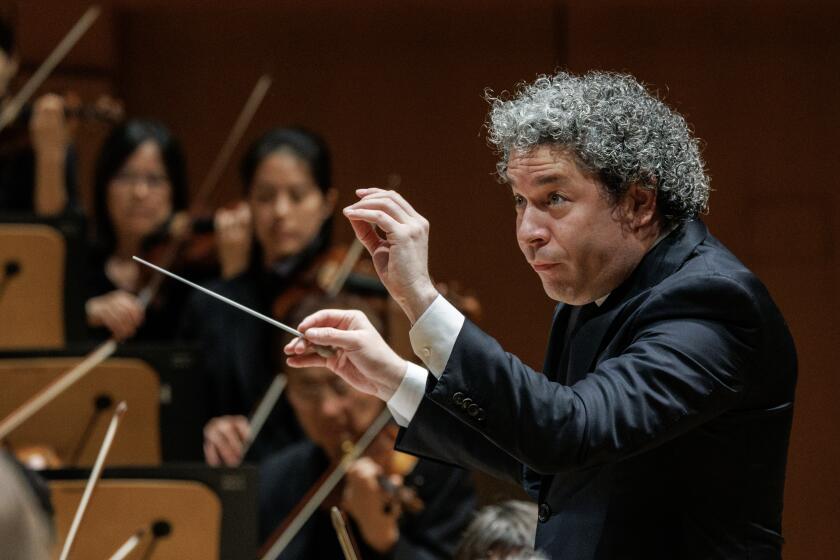Review: Revivals turn 2 problem-child musicals into something special
When the newly reworked version of Bill Russell and Henry Krieger’s “Side Show” opened at the La Jolla Playhouse last year, the production didn’t fix all the musical’s flaws, but it did reveal the heart that made this tough-sell show too good to consign to the filing cabinet of forgotten Broadway.
Bill Condon’s revival has now opened at Broadway’s St. James Theatre, and it has grown sharper since its San Diego tryout. It’s a pleasure to report that this tiptop production has realized much of the potential of this show about a pair of conjoined twins longing for stardom, love and, most futilely of all, a chance at normalcy.
Off-Broadway, another challenging musical has just been revived: “Allegro,” Rodgers and Hammerstein’s experimental collaboration that had a profound influence on Stephen Sondheim (who, it has been said, has spent his career trying to fix the show’s second act) and Hal Prince (whose imagination was fired up by the cinematic staging techniques it introduced).
Director John Doyle’s minimalist “Allegro,” with the cast doubling as the orchestra as with his productions of “Sweeney Todd” and “Company,” doesn’t make the case that this forerunner to the concept musical should get another crack at the Great White Way. His staging (which he also designed) is tailored to the intimate dimensions of Classic Stage Company, where last year he directed a much-lauded production of another tricky show, Sondheim and James Lapine’s “Passion.”
But it’s gratifying to see someone of Doyle’s caliber take a fresh look at a famous flop that has some magnificent music by Richard Rodgers, one classic song (“The Gentleman Is a Dope”) and a book by Oscar Hammerstein II that, for all its shortcomings, is trying to do something ambitious with the American musical.
With its menagerie of circus freaks and showbiz money-grubbers, “Side Show” was born to be a cult musical — making its return to Broadway a welcome surprise. The show had a brief run in 1997, winning critical favor from some august quarters but failing to capture a large enough audience.
Condon pulls off an interesting coup. Rather than mainstreaming the material, he makes it more startling to look at, with deformed creatures and human oddities strutting their scary stuff in the show’s opening number, “Come Look at the Freaks.”
But he fuses all this gruesome eccentricity with an alluring razzmatazz that connects “Side Show” to some of the best contemporary musicals, including two he helped bring to the screen: “Chicago,” for which he wrote the screenplay, and “Dreamgirls” (another tango with Krieger’s music), which he adapted and directed.
There’s even a touch of “Cabaret” in Condon’s handling of the number “One Plus One Equals Three.” All of this might sound a tad derivative, but this revival of “Side Show” synthesizes its influences so fluidly that the borrowings and quotations help establish a theatrical path for this tenderly original story to follow.
This musical undeniably sings with its own voice. Erin Davie and Emily Padgett, cast in the roles of the real-life Hilton sisters, meld their differing sopranos to sublime effect.
Two numbers in particular galvanize the show: “Who Will Love Me as I Am?,” which brings the curtain down on the first act in sensational fashion, and “I Will Never Leave You,” which is heartbreakingly reprised late in the second after the sisters’ romantic dreams have come to naught. These anthems are as stirring in their soaring melodies as they are in their universal sentiments.
David St. Louis, who plays Jake, the “Cannibal King” and Violet and Daisy’s self-appointed protector, practically causes a reshuffling of tectonic plates underneath the St. James during his seismic rendition of “You Should Be Loved.” His role in Russell’s somewhat cumbersome book has been finessed by Condon’s staging and dramaturgical interventions.
In La Jolla, the characters of Terry Connor and his partner, Buddy Foster, both of whom are determined to make vaudeville stars out of the Hiltons, were fuzzy in their motivations and desires.
Terry, now played by the dashing Ryan Silverman, cuts a more distinctive figure as the agent who would love Daisy if she could be separated from her sister. Buddy, played by Matthew Hydzik, is still a bit vague as Violet’s closeted gay love interest, but the vagueness is necessary and part of the story.
Condon, in short, has impressively sorted out the skein of relationships in a production that never lacks for velocity or verve. “Side Show” will probably never be a box-office juggernaut, but right now it’s the front runner to win the Tony for best musical revival.
“Allegro” tells, in a musicalized “Our Town” manner, the story of a doctor’s son from birth through medical school to adult disillusionment. A big-city physician whose marriage has proved a disappointment, he longs to return to his hometown, where people still matter more than money.
Produced on Broadway in 1947, the work was groundbreaking for its epic sweep, cinematic dissolves, Greek chorus and economic critique of America, where, as the old saying goes, nothing fails like success. But the show’s deficiencies — a seriousness unleavened with sufficient humor, Hammerstein’s sentimental lyrics — have more or less benched the musical.
Getting around the work’s infamously dreary and repetitive second act, Doyle has concentrated the show into an intermission-less 90-minute affair that’s perpetually in motion. The ensemble — featuring Malcolm Gets, Jessica Tyler Wright, Alma Cuervo and Elizabeth A. Davis — is exceptional both in acting and musicianship.
At the center of it all is the earnest young doctor played by Claybourne Elder, a performer with a captivating voice and a handsome innocence. That innocence turns out to be essential, for “Allegro” is benighted about matters of white privilege and patriarchy. (The retrograde gender politics, involving a materialistic two-timing wife, had my companion singing her own mock lyrics on the way home.)
Doyle, whose work with Sondheim includes an underappreciated production of “Road Show,” another musical skewering capitalist greed, is sometimes a little heavy-handed in his delivery of the political message. The lights come up on the audience during “Money Isn’t Everything,” a tactic that might be more resonant on Broadway than at the adventurous, pocket-sized CSC.
Rodgers’ lovely, gamboling music and the crisp, character-rich sound that emerged from the company, however, make “Allegro” a treat to encounter despite the glaring imperfections. Doyle may not be able to completely transform a musical that is as dated as it is innovative. But just as Condon did with “Side Show,” he has zoomed in on those qualities that make a problem-child musical so special.
More to Read
The biggest entertainment stories
Get our big stories about Hollywood, film, television, music, arts, culture and more right in your inbox as soon as they publish.
You may occasionally receive promotional content from the Los Angeles Times.







